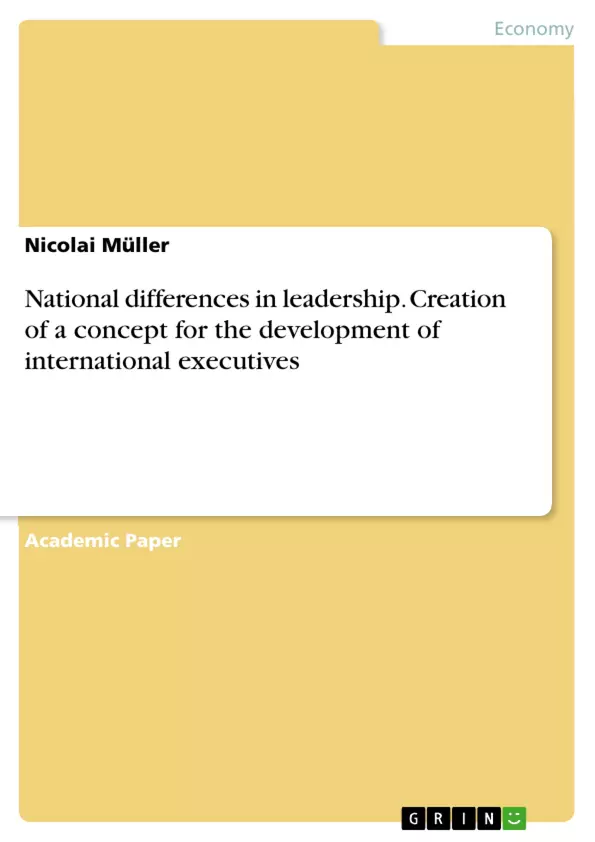This scholarly paper aims to create a concept for the development of international executives. The purpose of this concept is to empower international leaders to meet the challenges of different nationalities, cultures and resulting business practices. For this purpose, the current state of literature on national and international leadership practice is reviewed, national differences in leadership culture are analyzed and evaluated, and on this basis concrete measures for international leadership development are derived. Then, the essential measures are brought together to form a feasible concept for successful international leadership practice, which is compared with the management experience of a board member of a German S-DAX company.
The development of an international leadership concept is necessary because there is a gap in current research and literature in this field. Although the need for preparation for international leadership tasks is emphasized and some individual measures for leadership training have already been developed, there is no practical, holistic development concept. This will be the result of the authors of this paper.
The research was carried out as follows: First, the essential terms for the paper were defined and placed in an international context by means of the current literature. Afterwards, the secondary literature is analyzed in order to find out and to be able to systematize the essential differences of the world's largest economies. This is followed by an expert interview about dealing with the in-creased need for international leadership, a case study to transform failed to successful international leadership, after which the elaborated measures for international leadership development are presented.
One on of this paper’s main results is that a large part of the countries considered have big differences in their leadership practice due to cultural distinctions. Here, a transferability without adjustments would not be possible.
In this context, our solution concept consists of the following 5 measures for the development of successful international executives. First, we suggest the development of international leadership models. Second, an intercultural 360-degree-feedback should be implemented. Then a global company should introduce international employee surveys. In addition, international leadership assessment centers are needed.
Inhaltsverzeichnis (Table of Contents)
- Abstract
- Literature Review
- Definition of leadership in general
- Development and relevance of international leadership
- The role of culture in the international context
- Methodology based on a secondary analysis
- National leadership differences in the world's largest economies
- Analysis and findings- Development of an international leadership development concept.
- The need for international leadership development illustrated by a failed internationalization example.
- Why it is not possible to only transfer successful national leadership to other countries.
- Measures Concept for the development of international executives
- Conclusion
- Reference list.
Zielsetzung und Themenschwerpunkte (Objectives and Key Themes)
This paper aims to develop a concept for the development of international executives. The objective is to empower international leaders to meet the challenges of different nationalities, cultures, and resulting business practices. The paper analyzes national differences in leadership culture, derives concrete measures for international leadership development, and combines these measures into a feasible concept for successful international leadership practice.
- National differences in leadership culture
- Development of an international leadership concept
- Measures for international leadership development
- Challenges of globalization and internationalization
- The need for international leadership in a globalized world
Zusammenfassung der Kapitel (Chapter Summaries)
The abstract introduces the paper's objectives, methodology, and key findings. The Literature Review section defines international leadership and analyzes the role of culture in international leadership. The Methodology chapter details the research methods used, including secondary analysis. The chapter on National leadership differences in the world's largest economies analyzes the leadership cultures of major economies. Finally, the Analysis and Findings chapter presents the proposed concept for international leadership development, including a discussion of the need for such a concept and the limitations of transferring successful national leadership models to other countries.
Schlüsselwörter (Keywords)
International leadership, national leadership, culture, globalization, internationalization, leadership development, executive development, intercultural competence, business practice, global company, megatrends, corporate culture.
Frequently Asked Questions
What is the main goal of this international leadership concept?
The goal is to empower leaders to handle challenges arising from different nationalities, cultures, and international business practices.
Why can't successful national leadership just be transferred abroad?
Due to significant cultural distinctions, leadership styles effective in one country often fail in another without specific adjustments.
What are the 5 recommended measures for developing international executives?
The measures include international leadership models, intercultural 360-degree feedback, global employee surveys, and international assessment centers.
How does culture impact international business?
Culture shapes communication, decision-making, and employee expectations, making intercultural competence vital for global companies.
What methodology was used for this research?
The authors conducted a secondary analysis of literature, an expert interview with a DAX board member, and a case study of failed internationalization.
- Citar trabajo
- Nicolai Müller (Autor), 2018, National differences in leadership. Creation of a concept for the development of international executives, Múnich, GRIN Verlag, https://www.grin.com/document/972487



